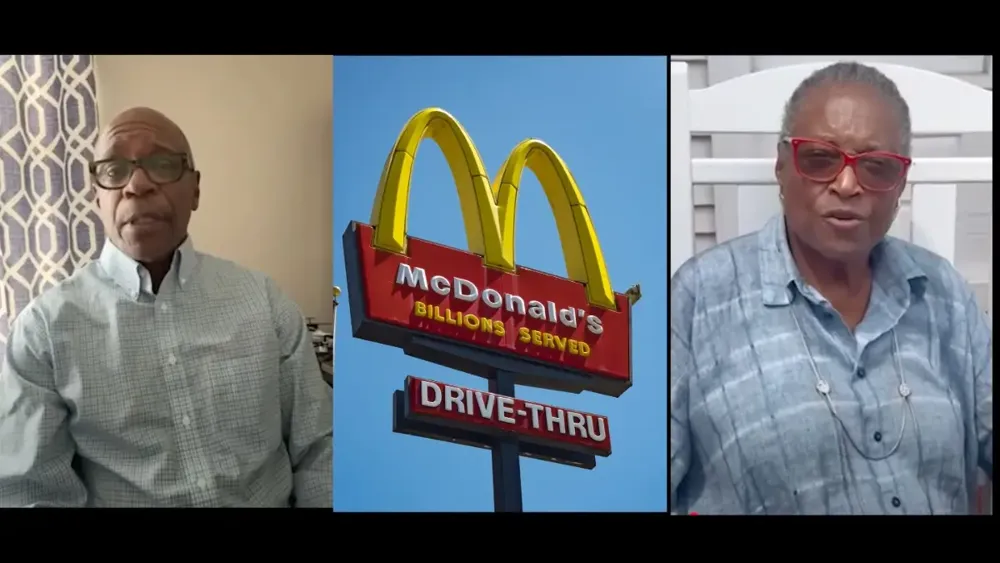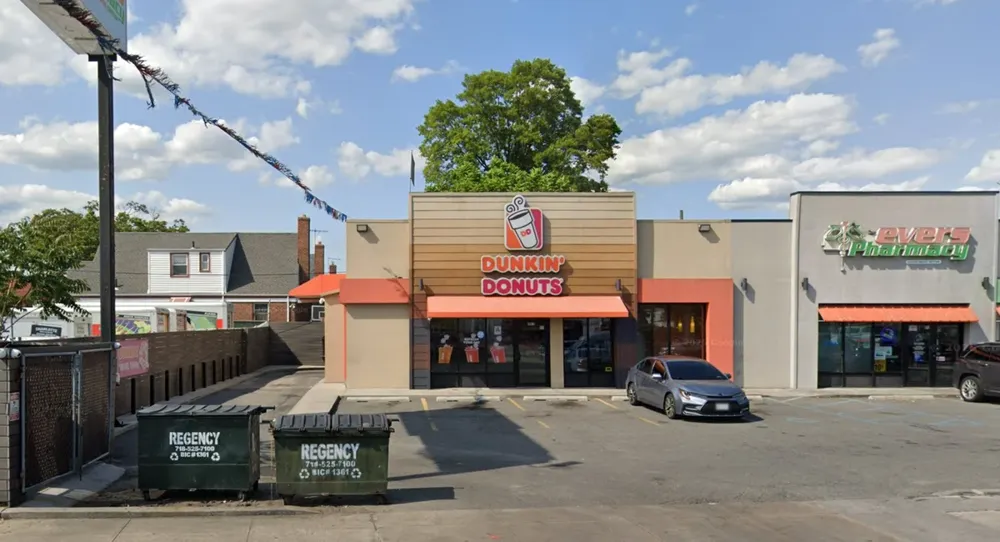‘The Game Was Rigged’: Former Black McDonald’s Franchisees Say McDonald’s Set Up Their Businesses to Fail, Now They’re Calling for a Boycott

This summer, more than 40 Black former McDonald’s franchise operators joined the call for a national boycott of the fast-food giant after it announced that it was rolling back its commitment to DEI initiatives earlier this year, including ending diversity goals for hiring and promoting employees and its prior pledge regarding supply chain inclusivity. The former franchisees’ economic action was in line with their ongoing legal efforts, as all are plaintiffs in a federal lawsuit filed in 2023 (and obtained by Atlanta Black Star) that accuses McDonald’s USA and McDonald’s Corporation of forcing them out of business due to systemic racial discrimination. The 48 plaintiffs claim that McDonald’s ruined their pursuit of the American dream to build generational wealth for their families by steering Black franchisees to less-desirable, poorly performing locations in Black neighborhoods, requiring them to make investments in their restaurants through costly rebuilds and renovations, denying them opportunities for growth (including buying stores in predominantly white neighborhoods with higher sales and profits), while denying them financial assistance that the corporation provided to white franchisees. Kenneth Manning (left) and Delores Crawford (right) are two of 79 Black former McDonald's owner/operators suing the fast-food company for racial discrimination. (Photos: Loevy + Loevy, Getty Images) When it came time to sell their restaurants, the lawsuit claims, McDonald’s wouldn’t let them sell to their preferred Black buyers and made them sell at lower prices to white buyers that the corporation had "hand-picked." “As our own experience confirms, racial injustice runs deep in the corporation, and taints the company’s carefully constructed image as a friend to the Black community,” the former operators said in a statement in June. ‘Very Callous’: A Black San Francisco Police Cadet Collapsed During Training and Died. What the Department Did Next Has His Family Suspecting Foul Play Among them is lead plaintiff Kenneth Manning, who started his 41-year McDonald’s career as a dishwasher at 16 and then managed a restaurant before pursuing a career as an owner/operator, eventually owning 20 restaurants in Alabama, Georgia and North Carolina. In 2009, McDonald’s regional vice president of operations Debbie Stroud offered Manning 10 company-owned stores in the Atlanta region, which were collectively underperforming by $11 million, the complaint says. He initially turned down the offer, but Stroud sweetened the deal by allowing him to buy five more stores in Montgomery if he also bought the unprofitable Atlanta stores. Manning took the deal, making him the second-largest operator in McDonald’s Eastern Division at the time. McDonald’s then subjected Manning to a demanding rebuild schedule that it did not require of white owner/operators, the lawsuit says. In his first year as a franchisee, he completed three rebuilds of the Atlanta stores, spending $5 million on top of the $16 million he had paid for the stores. No white owner/operators in the region were required to complete as many rebuilds in that time frame, he claims. Manning says he wasn’t given access to the kinds of support that other white owner/operators received, including rent relief, remodeling assistance and opportunities to buy more profitable stores, and was “treading water” while his white counterparts were “expanding their organizations, refinancing and building equity.” He alleges that McDonald’s “implied” that it would let him buy a new company-owned store being built down the road if he completed the renovations on one of his Atlanta stores within a year, which he did. But then the company “reneged” and sold that store to a white owner/operator based more than 40 miles away. When he protested, Darren Hall, a McDonald’s franchising executive, told Manning that he was not eligible for expansion, which Manning says was not true because Hall had been pushing him to purchase another underperforming store in the area only three months earlier. Hall later retaliated against Manning for speaking up about his unfair treatment to other company leaders, the lawsuit says, by "deploying its tactic of forcing Black operators out of the McDonald’s system by increasing unannounced inspections" of his stores. The company allegedly used this tactic to find infractions to justify a poor business review, which it could then rely upon to deem franchisees ineligible for expansion or to deny renewal of their leases. In the fall of 2013, at a meeting in Atlanta, Hall asked Manning to sell all of his stores and to refrain from buying any new stores until Hall had identified particular locations for purchase, the complaint says. Manning attempted to negotiate deals on his own, but Hall allegedly blocked them, cutting off his financing with Chase Bank. Amid increasingly onerous surprise inspections and urging from McDonald’s franchising managers to sell his stores and leave the system, Manning was “worn down from losing everything he had worked his life to build” and agreed, the lawsuit says. When he tried to sell his 16 stores in 2017 at market value to a franchisee with whom he had been negotiating, he says McDonald’s blocked the sale and forced him to accept lower offers from buyers the company had put forward, all of whom were white. “I walked away with less than what I had put in and far less than I had earned,” Manning said in a video posted on his attorneys’ website. “I invested everything I had — money, time, faith, and trust in the McDonald’s system. But what I didn’t know when I started was that the rules aren’t the same for everyone. ... The game was rigged." The lawsuit claims that McDonald’s engaged in a “pattern and practice” of forcing Black franchisees into substandard, low-profit stores in predominantly Black communities with high crime rates “based on their racist belief that customer sales would increase — and that McDonald’s’ bottom line would therefore improve — if stores were operated by individuals who had the same skin color as the rest of the community.” But once placed in these substandard locations, Black franchisees were forced to pay higher operating costs than their white counterparts due to security costs, higher insurance rates and higher employee turnover, the lawsuit says. But “when confronted with the economic harms it had caused, McDonald’s refused to provide Black franchisees with any of the needed financial assistance,” including a break on rent, “which it routinely provided to white owner/operators who did not face nearly as serious operating challenges.” When Black franchisees approached McDonald’s about buying in affluent white communities — stores that could have given them the cash flow to help pay costs at their lower-profit locations — McDonald’s uniformly denied them those opportunities because they were Black, the lawsuit argues, while consistently demanding that they complete unnecessary and costly renovations or remodels on their stores. McDonald’s intentional discrimination is evident in the number of Black franchisees in its system, the lawsuit says. From 1998 to 2020, the number of Black franchisees fell from 377 to 186. Meanwhile, the number of total McDonald’s stores doubled from 15,086 to 38,999. Stores owned by Black franchisees earn only about two-thirds of the average McDonald’s store. “When the environment turned adversarial I was really, really disappointed,” said Delores Crawford, who along with her daughter Christina owned nine restaurants in Augusta, Georgia, and Beaufort, South Carolina, between 1988 and 2018. The Crawfords were only offered stores in predominantly Black, low-income areas and faced serious security issues at several, the lawsuit says, including armed robbery and a murder in a parking lot. They employed an off-duty sheriff to guard one store on weekend nights and spent dearly on security overall, paying significantly more on labor than most McDonald’s restaurants. When their restaurant in North Augusta, which they had renovated, was underperforming by $700,00 per year, the Crawfords requested rent relief from McDonald’s, receiving “only $20,000,” which the lawsuit says is “far less relief than McDonald’s provides to its white franchisees.” The Crawfords also expressed concern to company officials about a new McDonald’s location opening up nearby, purchased by a white owner-operator that might provide competition for customers. They sought assistance from McDonald’s’ impact fund, which the company uses to mitigate the financial impact that a new restaurant has on another location’s sales, but were denied. Eventually the Crawfords, who were borrowing against the retirement funds of Delores Crawford and her husband, realized they couldn’t financially maintain their restaurants, and put them up for sale in October 2017. Christine Crawford sent the company franchising officer a list of potential buyers she wanted to speak to, including Jim Booth, a prominent white owner/operator in South Carolina. The company demurred and directed the Crawfords to sell instead to David Cravens, a white owner/operator in the region whom its executives had chosen. The Crawfords sold their restaurants for $5.1 million, which the complaint contends is significantly lower than the price they would have commanded if McDonald’s had not interfered in the sale. The lawsuit accuses McDonald’s of violating federal laws against race discrimination in contracting, in the leasing of real property, and of retaliation based on race against the 48 individually named defendants, as well as part of a discriminatory pattern or practice that was “so pervasive that it amounted to the Defendants’ standard operating procedure with regard to their treatment of Black franchisees.” It also claims breach of contract, fraud, tortious interference with business relationships and unjust enrichment by the company in violation of Illinois law. McDonald’s corporate headquarters is in Chicago. The plaintiffs seek a jury trial to determine unspecified compensatory and punitive damages to recompense their lost profits, lost business opportunities and other financial losses, damage to their professional reputations, and emotional injuries. McDonald’s, in its pleadings filed in March 2023, insisted that with 95 percent of its restaurants franchised, the company's success is “inexorably linked to the success of its franchisees,” and that the plaintiffs’ claims are “wholly inconsistent with McDonald’s commitment to DEI and its legacy of opportunity for diverse franchisees, including Black franchisees such as the Plaintiffs.” In arguing its motion to dismiss the lawsuit, the company said the plaintiffs — “independent business persons who owned and operated McDonald’s restaurants at varying time periods over the last several decades in different locations across the country, and each having very different circumstances and experiences — were not the victims of a decades-long, nationwide conspiracy by McDonald’s to discriminate against all of its Black franchisees.” Noting that a federal judge had in 2022 dismissed similar allegations and legal arguments against the company in a lawsuit filed in 2020 including some of the same plaintiffs, the company said the plaintiffs’ discrimination claims in their amended complaint “again rely upon vague and conclusory allegations that do not answer the foundational questions that this Court previously stated were necessary to state such a claim" of adverse and disparate treatment — "namely, what, when and who.” The company further argued that despite adding hundreds of new allegations, the Plaintiffs had failed to allege the necessary causation element of their claims, “that but for race, would not have suffered the loss of a legally protected right.” Most of McDonald’s 14,000 franchisees enter into a standard franchise agreement, the company said, which comes with a disclosure document that states that “buying a franchise is a complex investment” and advises prospective franchisees to consult with counsel or an accountant before investing. The franchise agreement spells out that the award of a franchise is not guaranteed, and if granted, does not come with a right to renew or extend or guarantee the award of additional franchises, the company noted. A franchisee is under no obligation to accept any franchise offered to it, but once a restaurant is purchased, franchisees must operate in compliance with the entire McDonald’s system, including making renovations and remodeling. Franchisees must pay fees to McDonald’s for the right to operate the franchise, including monthly rent, the agreement states. McDonald’s neither provides guarantees of financial success to franchisees nor makes representations about individual restaurant performance. Transfers of franchises require McDonald’s approval, and it has the right of first refusal. The defendants' motion to dismiss asserts that the amended complaints filed by the 48 plaintiffs in the “Manning” lawsuit as well as by the 31 plaintiffs in a separately filed and still active lawsuit with Ralph King as lead plaintiff “have failed to state a claim upon which relief can be granted,” in part because many of the allegations in each case are time-barred due to not falling within statutes of limitations. The Manning lawsuit “fails … as it again contains no allegation that McDonald’s implemented any policy with the specific intent to discriminate against Black franchisees. … Bald, inflammatory allegations are not sufficient.” McDonald’s argued that the plaintiffs rely on “boilerplate allegations that white franchisees were treated differently” without providing sufficient detail, such as which McDonald's employees were involved, or when the inequitable treatment occurred, to point to such discrimination. Some plaintiffs allege they were denied rent relief or loans solely because they were Black, the company observed, but “Plaintiffs were not guaranteed any financial assistance from McDonald’s.” Citing the judge’s previous order to dismiss the case, the defendants argued, “As the Court previously held … In fact, the franchise disclosure document made clear to franchisees ‘McDonald’s is not required to provide you with any assistance.” “Thus at the time Plaintiffs became franchisees, they agreed they were not entitled to the ‘services, facilities, rights and privileges’ they now claim, and there can similarly be no breach by McDonald’s for failing to provide these things," the company asserted. Regarding the allegations that McDonald’s made false statements about the availability, physical conditions and the future performance and profitability of franchise locations, the defendants argued that “the crux of their fraud claim continues to be that ‘McDonald’s failed to tell them that franchisees would make less money than franchisees in other locations.’ But as the Court already identified, ‘that theory runs into a basic problem’ because ‘several provisions of the franchise agreement … make clear the limitation of the relationship, as well as the risks of running the business.’” McDonald’s posited that any allegations that it interfered and lowered the value of an agreement that was still being negotiated between a Black franchisee and a prospective buyer or loan financer could not be deemed a tortious interference claim because Illinois law requires that plaintiffs allege a contractual breach, and a deal in the making is not a contract. The company further argued that the franchise agreement allows it to protect its brand and its business interests. In January, McDonald’s announced its decision to scale back its DEI policies after conducting a comprehensive “civil rights audit” and determining that given “the shifting legal landscape” it needed to modify a few of its practices. But the company insisted “our commitment to inclusion is steadfast,” and said that it would continue to “recruit team members from the communities in which we operate” and to create more opportunities for entrepreneurs, including “lean on franchisee affinity groups to help us solve business problems” and “building a franchisee pipeline that thrives in the communities we serve and fuels our growth.” The backlash against DEI has ramped up since President Donald Trump took office and issued a series of executive orders aimed at eliminating “illegal DEI” in the federal government and the private sector. The People's Union, a nonprofit led by activist John Schwarz, began organizing “economic blackouts” against big companies in February, motivated by the corporate rollback of DEI programs as well as other grievances, reported USA Today. The boycotts organized by the group against McDonald’s in June and August came at a tough time for the company, which faced a sharp drop in sales in the U.S. in the first quarter — the largest decrease in its home market since the height of the pandemic in 2020 – despite efforts to win back diners with menu changes and deals after hiking prices. “We’re boycotting McDonald’s because they’ve shown time and time again that profit matters more than people, from price gouging to tax evasion, from inequality in pay to exploitation in advertising,” Schwarz told USA Today. “And yes, their DEI efforts feel more like promotional stunts than real systemic change. We’re done funding companies that pretend to stand for something while doing nothing." In a statement, McDonald's said it was "disappointed to see these misleading claims that distort our values and misrepresent our actions.” The parties in both lawsuits against McDonald’s are still battling through motions and legal arguments and have not yet engaged deeply in the discovery process, which has been forestalled by U.S. District Court Judge Steven C. Seeger until the merits of the cases are more firmly decided. Seeger has not yet ruled on the defendants’ latest motions to dismiss. In its June 2023 response to the dismissal motion, the plaintiffs in the Manning lawsuit said its claims were “serious and highly meritorious,” and noted that their amended complaint included 48 detailed, "highly factual" narratives of the company’s discriminatory and illegal acts against 48 Black franchisees, and “provided a level of rich detail that far exceeds” the legal plausibility standard. “And while each individual Plaintiff’s allegations could stand on their own, their common experiences are striking and demonstrate that McDonald’s program of racist treatment was endemic to the company and pervaded all its interactions with its business partners,” the plaintiffs' attorneys argued, adding that they “deserve their day in Court” and a chance “to subject their claims (and any defenses McDonald’s might raise) to discovery.”

